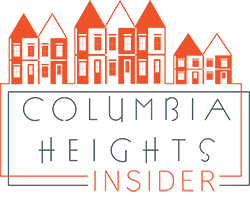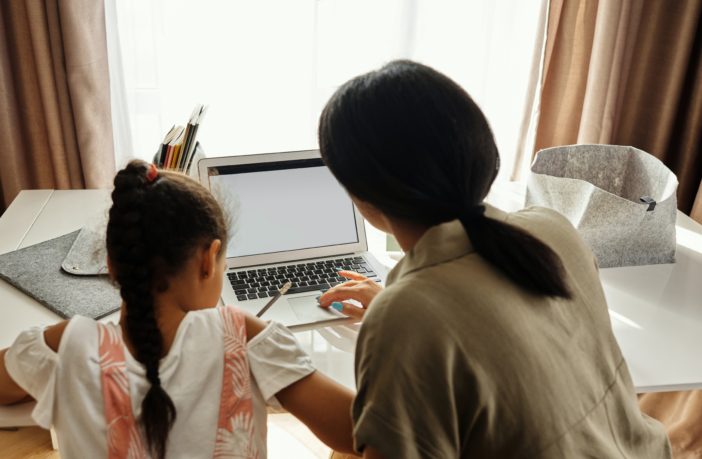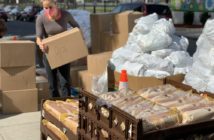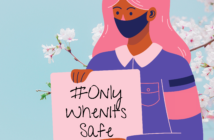Since March, DCPS and DC public charter schools have been operating on remote schedules, while school facilities have been transformed as pick-up stations for grade-level learning packets, technology devices, and meal distribution.
Schools have been forced to quickly adopt distance learning curricula heavily dependent on variables such as safe housing, internet access, and devices such as laptops and tablets. Without a standard operational formula, available support opportunities vary per Ward, neighborhood, and school community—often leaving parents and families in the lurch.
Beatriz Ariza has two daughters in school: a 7th grader at Cardozo Education Campus in Columbia Heights (Marely) and an 8-year-old who attends Thomson Elementary School (Kelly).
Both of her daughters were provided computers from their respective school, but Ariza has not been able to pay for internet access since she lost her job. Luckily, Marely’s laptop comes ready with WiFi so she’s able to participate in distance learning sessions. Ariza says, “Marely’s making progress on her school work and from her grades, she’s doing fine.”
Unfortunately, in Kelly’s case, her school-issued laptop does not have WiFi. In order for Kelly to participate in school, Ariza has to be more hands-on—helping Kelly switch between her mom’s cellphone and iPad throughout the day depending on which device has better reception.
Bernardo Heres, the Cardozo Community School Coordinator for the Latin American Youth Center (LAYC), supports youth and families at the Cardozo Educational Campus. He works in partnership with the Mayor’s Office on Latino Affairs and Following Francis, with permission from Principal Arthur Mola, to use the school’s parking lot to distribute food, provide toiletries, and offer rental assistance on a weekly basis to Cardozo families. “It’s a team effort to support families impacted by the pandemic,” says Heres.
The Ariza family relies on the resources provided by LAYC and their community partners to cover rent and essential goods during the pandemic. While these resources have been a tremendous help, Ariza’s husband and son have also been unemployed since earlier this year, making Internet access out of budget for the family.
Kim Gutierrez, a Community Organizer with Parents Amplifying Voices in Education (PAVE), says that their organization is working collaboratively with schools to “identify the needs of families and compliment whatever isn’t already available within the school community and complement with things like providing Chromebooks, groceries, and mental health services.” Since March, they’ve had to quickly pivot to expand their services to include food distribution, connecting families with critical services, and assisting families in accessing the technology needed to participate in distance learning.
PAVE also provides school supplies to families that complete surveys on their experiences with distance learning. These surveys, available in English and Spanish, are a crucial advocacy tool to provide an opportunity for DC families to collectively tell their stories that are made available to key education leaders in the city.
Maria Vanessa Magana-Martinez, a Columbia Heights resident and a PAVE parent leader, is a widow and the mother of Alexis, a 6-year old with Down’s Syndrome who attends Cleveland Elementary School. As a single working mother, distance learning has been tough. While grateful to her employer for granting her a flexible schedule, Magana-Martinez has to be hands-on with Alexis’ education program and present for as many of his sessions as possible “to make sure that he has the same opportunities to participate in his classes.”
Despite her busy work schedule, Magana-Martinez still finds time to participate in the rigorous 8:45am to 3:15pm schedule provided to Cleveland Elementary students. And while the students do get frequent breaks during the school day, she says she “wishes that Alexis had more regular one-to-one sessions with the special education coordinator because he needs more support with large class sizes of over 20 students at one time [which]can be overwhelming.”
Her struggle is not unique. Fabio Molinares, father of twin 3-year-olds, took a voluntary leave of absence with 25% reduced pay from his job at an area airport to help his children transition into virtual school. His children currently attend Pre-K3 at the Latin American Montessori Bilingual (LAMB) Public Charter School.
Since the start of the school year, LAMB has offered in-person sessions from 8:15am to 3pm, giving Molinares time to run errands and prepare to return to his work full-time. However, the school will be transitioning to a hybrid schedule starting in October. He feels uneasy about the switch in routine because he is scheduled to return to work in-person and “worries about getting a day shift schedule, during the days the twins are also scheduled to be at home.” He also has concerns about distance learning for his twins because the Montesorri model—a hands-on teaching pedagogy—is difficult to translate to an internet platform.
When asked about their feelings on Mayor Bowser’s recently announced plan to begin hybrid learning on November 9, most parents we interviewed expressed readiness for schools to return to in-person learning.
“I would like for my daughters to go back to school but when I can be sure that teachers and staff are properly trained on safety,” shares Ariza.
Margana-Martinez feels torn between the need to keep her son safe and the importance of socialization. “If I’m not too tired by November, I might say no,” she shares. “I am grateful for the regular communications from the Chancellor yet I’m about 85% confident and am torn because my son needs time to socialize with his classmates.”




